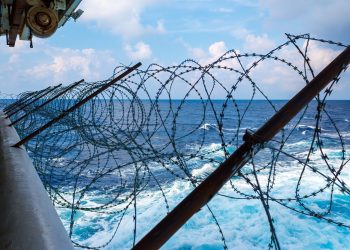Lack of access to vaccinations for seafarers is placing shipping in a ‘legal minefield’ while leaving global supply chains vulnerable, ICS warned. The warning comes amid concerns that vaccinations could soon become a compulsory requirement for work at sea, according to a legal document to be circulated later this week by ICS.
As explained, recent reports reveal that some states are insisting all crew be vaccinated as a pre-condition of entering their ports. However, reports estimate that developing nations will not achieve mass immunization until 2024, with some 90% of people in 67 low-income countries standing little chance of vaccination in 2021. In this respect, ICS calculates that 900,000 of the world’s seafarers (over half the global workforce) are from developing nations.
This is creating a ‘perfect storm’ for shipowners, who may be forced to cancel voyages if crew members are not vaccinated. They would risk legal, financial, and reputational damage by sailing with unvaccinated crews, who could be denied entry to ports,
…ICS noted.
According to ICS, delays into ports caused by unvaccinated crew would open up legal liabilities and costs for owners, which would not be recoverable from charterers. Furthermore, while owners would be able to address the need for seafarer vaccines in new contracts, owners attempting to change existing contracts or asking the crew to receive a specific vaccine requested by a port could open themselves up to legal liabilities.
[smlsubform prepend=”GET THE SAFETY4SEA IN YOUR INBOX!” showname=false emailtxt=”” emailholder=”Enter your email address” showsubmit=true submittxt=”Submit” jsthanks=false thankyou=”Thank you for subscribing to our mailing list”]
The uncertainty comes as shipping is expected to overtake aviation in the race to deliver vaccines around the world in the second half of 2021, in a distribution drive that is estimated to take four years. Shipping is also a vital method of transportation for accompanying personal protective equipment (PPE), whose estimated total volume will be 6-7 times that of the vaccine and refrigeration systems.
Seafarers are among the most internationalized workers in the world, crossing international borders multiple times during a contracted period, with up to 30 nationalities onboard at any one time. ICS’s legal document noted that it is likely that a Covid-19 vaccination: ‘Will be required by most if not all states and therefore it would reasonably be considered to be a “necessary” vaccination.’
We’re already seeing reports of states requiring proof of COVID-19 vaccination for seafarers. If our workers can’t pass through international borders, this will undoubtedly cause delays and disruptions in the supply chain. For a sector expected to help drive the global vaccination effort, this is totally unacceptable. This is a key issue for shipping but could also have a significant impact across many sectors as international business recovers,
…stressed ICS secretary-general Guy Platten.
The shipping industry needs to find creative solutions to the problem. In the short term this means getting seafarers vaccinations in their countries where there are established programmes and sufficient supplies of vaccines. In the long term it’s about exploring the idea of public-private partnerships. There may even be the opportunity, when the initial surge of need is met for national allocation, for manufacturers to provide vaccinations directly to shipowners to allocate/administer to these key workers,
…added Bud Darr, Executive Vice President, Maritime Policy and Government Affairs at MSC Group.
ICS is currently exploring solutions, including the implementation of vaccination hubs across key international ports, as suggested by the Cypriot government.
There are currently more than 50 vaccines each at different stages of testing and approval and only some of these have been recognised by WHO as suitable for emergency use. Yet some states are imposing vaccines for seafarers that are not on the WHO list of vaccines for Emergency Use. If we’re to maintain internationalised workforces, this needs to change immediately,
…Guy Platten concluded.
Earlier this week, ICS expressed concerns that the number of seafarers affected by crew change crisis is on the rise again due to travel restrictions imposed by governments in response to new variants.































































